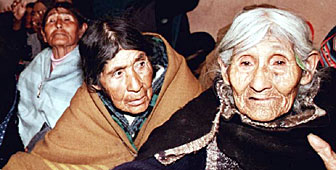Switzerland tackles the global challenge of ageing

Switzerland will be pushing for greater attention on the problems faced by developing countries, when the United Nations Assembly on Ageing opens in Madrid on Monday.
The Second World Assembly on Ageing, which is the first such meeting for 20 years, is being held to help governments and societies ensure the needs of the elderly are taken into account in developing public policy
The Swiss delegation, led by interior minister, Ruth Dreifuss, is concerned that the elderly are often the most disadvantaged and forgotten sector of society. The problem is most severe in developing countries and Eastern Europe.
That is a factor the Swiss Development Agency is already taking into account as it plans future projects.
The International Federation of Red Cross and Red Crescent Societies warned last week that in Africa alone, an estimated five million grandparents had become the primary carers for their grandchildren because the children’s own parents had died from Aids.
The world’s population is getting older and according to UN statistics the number of old people worldwide is expected to quadruple over the next 50 years. That will mean an increase from the current level of about 600 million to almost two billion people.
New forms of poverty
In most societies the elderly are often among the poorest. They lack material resources as well as access to health care and exclusion from the economic system.
The disappearance of the traditional roles played by the elderly in the past has also led to increased social isolation.
Developing countries face the toughest challenges because they will be forced to deal with development and an ageing population at the same time.
Gender differences
The Swiss delegation also wants to raise the issue of the different challenges and conditions faced by men and women.
On average women outlive men by almost seven years, and they are more likely to live on their own but have a lower income than men of the same age.
In many parts of the world, elderly women’s poverty is compounded by discriminatory practices, which limit their inheritance rights and their access to resources.
Domestic issues
Switzerland is using the Assembly as an opportunity to examine its own policy towards the elderly and the challenges it faces.
Almost 20 per cent of the country’s population is of retirement age and government policy needs to address issues such as public services for the elderly and their participation in public, and particularly political life.
It also needs to focus on the demands an ageing population will have on health and social services and on the increased number migrants who are choosing to remain in Switzerland beyond retirement age.
It’s hoped that the Assembly will provide the opportunity for old peoples’ homes, professional organisations and self-help groups to establish links and develop partnerships between Switzerland and other participating countries.
Twenty years later
An International Plan of Action on Ageing was adopted after the first World Assembly held in Vienna in 1982. That plan recommended a number of initiatives in employment and income security, health, housing, education and social welfare.
The Madrid Assembly is expected to adopt a revised plan of action, taking into account social, cultural, economic and demographic changes of the last 20 years.
swissinfo with agencies

In compliance with the JTI standards
More: SWI swissinfo.ch certified by the Journalism Trust Initiative
You can find an overview of ongoing debates with our journalists here. Please join us!
If you want to start a conversation about a topic raised in this article or want to report factual errors, email us at english@swissinfo.ch.